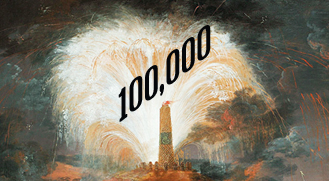
Created from ‘Fireworks in honour of Catherine II in 1787’, by Jan Bogumił Plersch. (Lviv National Art Gallery; source of image: Wikimedia Commons)
Something wonderful has just taken place: EMLO-Edit, the hidden working interface at the core of our online union catalogue, has clocked up six figures and is now host to more than 100,000 letter records. If this were not reason enough to let off a few fireworks, it is a double delight for us to note that it was the sixteenth-century Swiss scholar and polymath Johann Wilhelm Stucki (1542–1607) who was in the hot seat as his epistolary calendar moved from our preparatory collation area to top this landmark figure.
This time last year, Stucki did not exist in EMLO-Edit beyond records for three letters in the Bodleian Library; but over the past twelve months the talented young scholar and EMLO visitor Marc Kolakowski has brought him to life. Funded by the Université de Lausanne with a Swiss National Science Foundation doctoral mobility study grant, Marc applied to Cultures of Knowledge to be based within the project for the academic year 2014–15. Seizing the baton from our inaugural visiting fellow, Liège doctoral student Charlotte Marique, he divided his time between work on his doctoral thesis, learning EMLO’s editorial procedures and practices, helping to develop and trial our epistolary collation and visualization tools, and assisting in the preparation of large quantities of late sixteenth-century metadata for upload: Justus Lipsius, Christophe Plantin, Theodor Zwinger, Philippe Duplessis Mornay, and Amandus Polanus von Polansdorf, to name but a few. As he pursued his archival research, Marc also created his own catalogue of metadata using EMLO’s collation tools for more than a thousand letters to and from Stucki. This metadata, now combined with other correspondences in our working area EMLO-Edit, has just nudged us over the 100,000 mark [sorry, no pun intended!]. But because this material is still work-in-progress, Marc will continue to refine, enhance, and hone his significant contribution prior to making it public at a time of his choice.
The desiderata and needs of scholars are at the heart of everything we do and all we hope to develop. During his stay, Marc has been involved in the testing processes and discussions held during EMLO’s second phase of development. His input, as a scholar working with manuscript letters, has been invaluable, and we would like to extend our heartfelt thanks to him and to wish him every good fortune from this point forward. As Marc’s period of residency here, although thankfully not his involvement with EMLO, draws to a close, we would be extremely interested to hear from other scholars, young and old, who might wish to pursue their studies for a period under the aegis of Cultures of Knowledge. Is early modern correspondence central to your research? Are you at, or are you about to embark upon, post-graduate studies? Would you be interested in gaining editorial experience as well as significant insight into the inner workings of a major project in the digital humanities? Do you like the idea of contributing in some meaningful way as we work to record a second hundred thousand letters within the union catalogue? If so, and you would like to discuss a potential residency with us, please be in touch. We’d love to hear from you!
